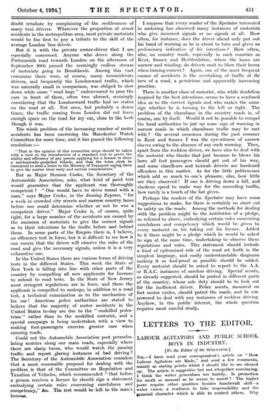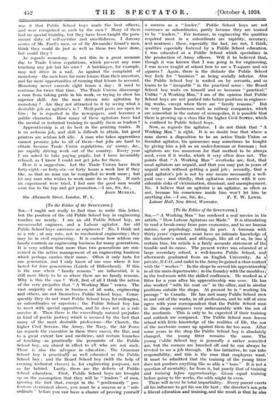LETTERS TO THE EDITOR.
LABOUR AGITATORS AND PUBLIC SCHOOL BOYS IN INDUSTRY.
[To the Editor of the SPECTATOR.] Sra,—I have read your correspondent's article on " How Labour Agitators are Made," and send a few comments, mainly as stating points which I should like to see cleared up. The article is suggestive but not altogether convincing. I think the writer generalizes too hastily. Is promotion for merit so unusual as he seems to assert ? The higher posts require other qualities besides handicraft skill—a wider vision, a readiness to take responsibility and the personal character which is able to control others. Why was it that Public. School boys made the best officers, and were recognized as such by the men ? Many of them had no special training, but they have been taught the para- mount duty of self-sacrifice and unselfishness. I daresay scores of Mr. Ford's men, or of Sir Alexander Grant's men, think they could do just as well as those two have done, . but could they ?
. As regards monotony. Is not this in a great measure due to Trade Union regulations, which prevent any man touching any job but his own ? A bricklayer, for example, may not drive in a nail. As against the complaint of monotony—the men have far more leisure than their ancestors, and far more opportunities of turning that leisure to account. Monotony never exceeds eight hours a day : it used to continue for twice that time. The Trade Unions discourage a man from taking pride in his work, or trying to show his superior skill. Are the men driven into agitation by monotony ? Are they not attracted to it by seeing what a desirable job an agitator's is ? Well-paid posts are open to him ; he is reported in the newspapers, and becomes a public character. How many of these agitators have had the mental or technical training to qualify them as leaders ?
Apprenticeship is at its best in the printing trades. It is an arduous job, and skill is difficult to attain, but good printers are seldom left idle. A man who takes apprentices cannot promise jobs to all of them—but jobs are hard to obtain because Trade Union regulations, ca' canny, &c., arc rapidly driving work out of the country. Every year I am asked to take paying pupils, but I have invariably refused, as I know I could not get jobs for them.
Here is a suggestion. Let the Trade Unions have their forty-eight--or forty-six—or forty hours a week law if they like, so that no man can be compelled to work more ; but let any man who wishes to work more do so freely. If such an experiment were tried, I feel sure the good men would soon rise to the top and get promotion.—I am, Sir, &c.,



















































 Previous page
Previous page